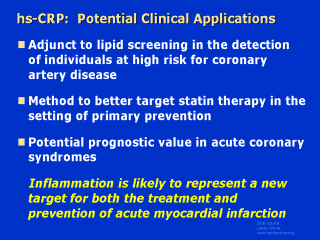 |
Where then do we
stand in our understanding of the clinical application of inflammatory markers like CRP to
clinical settings? First, CRP screening may well have efficacy as an adjunct to lipid
screening in the detection of individuals at high risk for coronary artery disease.
Second, as suggested by the data from AFCAPS/TexCAPS, CRP screening may provide an
improved method for targeting statin therapy in the setting of primary prevention. This
issue is of obvious clinical importance as we try improve the cost-effectiveness of these
agents. The third general conclusion relates to the acute coronary syndromes. Although not
reviewed in this discussion, the processes of plaque degradation and plaque rupture in the
acute setting are also highly predicated on the inflammatory response. Thus, many
investigators have embarked upon novel therapies linked to inflammation as new methods of
attenuating ischemic damage in the setting of acute plaque rupture. Clinical trials are
now being organized to look at novel anti-inflammatory agents in that setting. Finally,
inflammation itself is likely to represent a new target for both the treatment and
prevention of acute myocardial infarction. |
